|
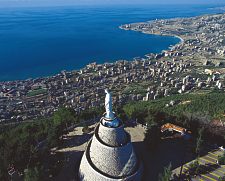
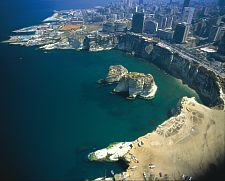
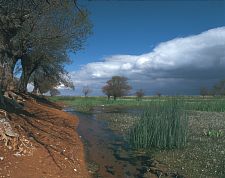
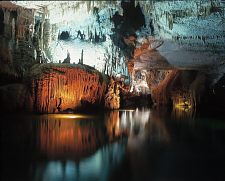
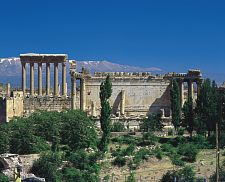
| |
The Dilemma of Democracy in Lebanon
by Bilal Y. Saab and Elie D. Al-Chaer*
06 November 2007 |
Common Ground
News Service (CGNews)
Arabic |
عربي
French |
Français
Also reported by
The
Brookings Institution
Bilal Y. Saab, a senior research assistant at the Brookings Institution, and
Elie D. Al-Chaer, an attorney and founder of the Center for Democracy in
Lebanon, look at the similarities between Lebanon's political system and world
politics. In this context, they suggest next steps for domestic political
players to take the country down the path towards full-fledged democracy.
Washington, DC - In
the history of US-Lebanese relations, no American president has pledged to
support Lebanese democracy more than G.W. Bush. No American president has
invited Lebanese officials to the White House more than G.W. Bush. Why? Because
there is no question in President Bush's mind that Lebanon can serve as a great
example of what is possible in the broader Middle East. Lebanon, as President
Bush has repeatedly said, is at the heart of his administration's Mideast
democracy-promotion strategy.
Yet despite all this US attention and care for Lebanon, the biggest political
coalition in that country – which has a majority in both the legislative and
executive branches of government – has been powerless in passing laws and naming
a president. Indeed, why has the pro-US coalition of parliamentary majority
leader Saad Hariri failed to rule like any other majority operating in a
democratic setting would?
For many, the answer seems fairly simple and obvious: the pro-Syrian/Iranian
opposition, spearheaded by Hizbollah (the US-labelled terrorist group), is
preventing the pro-American coalition from ruling through a variety of pressure
tactics. For example, how can the majority pass a bill when the pro-opposition
Speaker of Parliament Nabih Berri has shut Parliament's doors? How can they
elect a president when Berri refuses to convene a session in Parliament? How can
the cabinet implement much needed economic reforms when six opposition ministers
are boycotting its sessions? How can government generally function when the
other side deems it unconstitutional?
But the situation is more complicated than that. The political objectives of
Hariri's anti-Syrian coalition, while perfectly genuine and noble, have failed
to materialize largely because of the very nature of the Lebanese political
system. Political sectarianism (which means that senior positions in the
Lebanese government, Parliament and the administration are allocated on the
basis of sectarian identity), not necessarily the opposition's agenda, has let
down the aspirations of all Lebanese who are calling for a free, democratic, and
sovereign Lebanon. How so?
The Lebanese system sadly resembles that of world politics: it is essentially
anarchic. In Lebanon, a delicate balance of power between different religious
communities assures public security and political stability. While appealing on
the surface, this system has its costs. Any alteration in that balance of power,
whether caused by internal dissatisfaction or external intervention, can cause
the government to disintegrate.
Since its independence from French mandate in 1943, government in Lebanon has
been consultative. The founders of the Republic realized early on that the
consultative system was best suited to lead to cooperative and stable life. The
events of March 14, 2005 notwithstanding (when more than one million Lebanese
demonstrated in unity against Syrian presence and control), attempts to arouse a
truly national consciousness have so far failed to overcome particularistic
suspicions.
Does this mean that Lebanon should return to, and settle for, consensus politics
and abandon its liberal democratic aspirations? The answer is no. Lebanon is not
destined to balance political stability with full-fledged democracy. No complex
modern society can live and grow solely on consensus; it needs governmental
institutions capable of making decisions which consensus alone cannot make.
But if we believe that anarchy is what states make of it, then we should have
confidence in the Lebanese people's ability to escape from this condition of
non-statehood and peacefully transition from a limited democracy to a developed
one.
The governing coalition in Lebanon should not be faulted for its aspirations,
but for how it came about and tried to pursue them. By now its leaders should
have learned the lessons of the past and appreciated the traps of the system.
Simply put, Hariri's coalition cannot rule without negotiating with the other
and cannot impose its will or ideas on the opposition. This obviously goes for
the opposition too. Hence the critical need to come out of this current mess by
electing an independent president who can oversee the transition from a system
of particularistic politics (the current one) to majoritarian politics (the one
aspired for). The United States can help Lebanon fulfill that project by
respecting the balance of power between its religious communities and continuing
to protect it from undue Syrian intervention.
Ambitious and wholesale changes of the Lebanese political system as proposed
(whether consciously or unconsciously) by Hariri's coalition cannot take place
overnight or without elite consensus, since elites are the agents of change in
Lebanon. Gradualism is the only steady and desirable path for Lebanon toward
full-fledged democracy.
* Bilal Y. Saab is a senior research assistant at the
Saban Center for Middle East Policy at the Brookings Institution. Elie D.
Al-Chaer is an attorney and counselor at law and founder of the Center for
Democracy in Lebanon. This article is distributed by the Common Ground News
Service (CGNews) and can be accessed at
www.commongroundnews.org.
Source: Common Ground News Service (CGNews), 6 November 2007,
www.commongroudnews.org
Copyright permission has been obtained for publication.
أزمة الديمقراطية في لبنان
بقلـم بلال صعب وإيلي الشاعر
06 نوفمبر/تشرين الثاني 2007
يلقي بلال صعب الباحث المساعد بمعهد بروكنغز
وإيلي الشاعر المحامي والمستشار
القانوني
ومؤسس مركز الديمقراطية في لبنان
نظرة على أوجه التشابه بين نظام لبنان السياسي والسياسة العالمية. ويقترحان في
هذا المضمون الخطوات التالية للاعبين السياسيين المحليين للسير بالدولة في طريق
الديمقراطية الشاملة.
واشنطن العاصمة – لم يتعهد رئيس أميركي في تاريخ
العلاقات الأميركية اللبنانية بدعم الديمقراطية اللبنانية كما فعل جورج دبليو بوش.
لم يدع رئيس أميركي مسؤولين لبنانيين إلى البيت الأبيض أكثر مما فعل جورج دبليو
بوش. لماذا؟ لأنه لا يوجد شك في ذهن الرئيس بوش بأن لبنان يمكن أن يشكل مثالاً
عظيماً لما هو ممكن في الشرق الأوسط الأوسع. فلبنان، كما كرر الرئيس بوش القول،
هو في قلب إستراتيجية إدارته لتشجيع الديمقراطية في الشرق الأوسط.
إلا أنه رغم هذا الاهتمام الأميركي كله وهذه الرعاية كلها للبنان، بقي أكبر تحالف
سياسي في الدولة، والذي يملك غالبية في كل من السلطتين التشريعية والتنفيذية في
الحكومة، لا حول له ولا قوة في سن القوانين وتعيين رئيس للدولة. لماذا فشل سعد
الحريري، زعيم التحالف المؤيد للولايات المتحدة في الغالبية البرلمانية في الحكم
مثله مثل أي زعيم غالبية يعمل في بيئة ديمقراطية؟
يبدو الجواب بالنسبة للعديد من الناس بسيطا وواضحا نسبياً: تقوم المعارضة المؤيدة
لسوريا وإيران، والتي يشكل فيها حزب الله (الذي تعتبره الولايات المتحدة مجموعة
إرهابية) رأس الحربة، بمنع التحالف المؤيد لأمريكا من الحكم من خلال تكتيكات ضغط
متنوعة. على سبيل المثال، كيف يمكن للأغلبية أن تقوم بإنجاح مشروع قانون بعد أن
قام نبيه بري رئيس البرلمان المؤيد للمعارضة بإغلاق أبواب البرلمان؟ كيف يمكنهم
انتخاب رئيس عندما يرفض بري عقد جلسة لهذا البرلمان؟ كيف يمكن لمجلس الوزراء
تطبيق إصلاحات اقتصادية الدولة في حاجة ماسة لها عندما يقاطع ستة وزراء من
المعارضة جلسات المجلس؟ كيف يمكن للحكومة أن تعمل بشكل عام عندما يعتبرها الطرف
الآخر غير شرعية؟
إلا أن الوضع أكثر تعقيداًَ من ذلك. فقد فشلت أهداف الحريري السياسية المعادية
للتحالف السوري رغم أنها أصيلة ونبيلة بشكل كامل، في التحقق، بسبب طبيعة النظام
السياسي اللبناني إلى درجة كبيرة. فالطائفية السياسية (والتي تعني أن المناصب
الكبرى في الحكومة اللبنانية والبرلمان والإدارة يجري تخصيصها على أساس الهوية
الطائفية) وليس بالضرورة أجندة المعارضة، خذلت تطلعات جميع اللبنانيين الذين
ينادون بلبنان حر ديمقراطي ذي سيادة. كيف حدث ذلك؟
المحزن أن النظام اللبناني يشبه السياسة الدولية، فهو فوضوي بشكل أساسي. ففي
لبنان، يضمن توازن حساس في القوى بين الجاليات الدينية المختلفة الأمن العام
والاستقرار السياسي. ورغم أن هذا النظام يبدو جذاباً على الواجهة إلا أن له كلفته.
فأي تغيير في توازن القوى هذا، بغض النظر عما إذا كان سببه عدم الرضا الداخلي أو
التدخل الخارجي، يستطيع أن يؤدي إلى تداعي الحكومة.
منذ استقلالها عن الانتداب الفرنسي عام 1943، كانت الحكومة في لبنان تشاورية. فقد
أدرك مؤسسو الجمهورية مبكراً أن النظام التشاوري كان هو الأفضل ليؤدي إلى حياة
تعاونية مستقرة. وباستثناء أحداث الرابع عشر من آذار/مارس 2005 (عندما تظاهر أكثر
من مليون لبناني بشكل موحد ضد الوجود السوري وسيطرته)، فإن محاولات إثارة وعي
وطني حقيقي فشلت حتى الآن في التغلب على شكوى ذات طبيعة محددة.
هل يعني ذلك وجوب عودة لبنان إلى الإجماع السياسي وقبوله والتخلي عن تطلعاته
الديمقراطية الليبرالية؟ الجواب هو لا. ليس قدر لبنان أن يوازن بين الاستقرار
السياسي والديمقراطية الكاملة. لا يستطيع أي مجتمع حديث معقد أن يعيش وينمو على
الإجماع فقط، فهو بحاجة لمؤسسات حكومية قادرة على اتخاذ القرارات التي لا يستطيع
الإجماع وحده اتخاذها.
ولكن إذا صدقنا أن الفوضى هي ما تستطيع الدولة أن تفعله بها، توجب علينا أن تكون
لنا ثقة في قدرة الشعب اللبناني على الهروب من هذه الحالة من اللادولة وأن تتحول
بسلام وهدوء من ديمقراطية محدودة إلى أخرى متطورة.
يجب عدم إلقاء اللائمة على التحالف الحاكم في لبنان بسبب تطلعاته، وإنما بسبب
كيفية وصوله إلى الحكم ومحاولاته تحقيق هذه التطلعات. ولكن يجب أن يكون قادته قد
تعلموا الآن من دروس الماضي وفهموا أشراك النظام. ببساطة، لا يمكن لتحالف الحريري
الحكم دون التفاوض مع الآخر، ولا يستطيع فرض مشيئته أو أفكاره على المعارضة. وهذا
ينطبق بالطبع كذلك على المعارضة. ومن هنا تنبع أهمية الحاجة الحاسمة للخروج من
الفوضى المسيطرة حالياً عن طريق انتخاب رئيس محايد يستطيع الإشراف على عملية
الانتقال من نظام تعددي السياسة (النظام الحالي) إلى سياسة الأكثرية (تلك التي
نرنو إليها). تستطيع الولايات المتحدة مساعدة لبنان على تحقيق ذلك المشروع من
خلال احترام ميزان القوى بين مجتمعاته الدينية والاستمرار في حمايته من التدخل
السوري غير المقبول.
لا يمكن لتغييرات طموحة وإجمالية في النظام اللبناني كما يقترح الحريري (عن وعي
أو عن غير وعي) أن تحصل بين ليلة وضحاها أو في غياب إجماع النخب حيث أن النخب هي
عوامل التغيير في لبنان. التدريجية هي الطريق الوحيد الثابت والمرغوب به للبنان
نحو الديمقراطية الكاملة.
*بلال صعب مساعد
أبحاث رئيسي في مركز صبان لسياسة الشرق الأوسط بمعهد بروكنغز. إيلي الشاعر محامٍ
ومستشار في القانون ومؤسس مركز الديمقراطية في لبنان.
تقوم خدمة Common
Ground الإخبارية بتوزيع هذه النسخة المختصرة من المقال التي يمكن الحصول عليه عن
الموقع www.commongroundnews.org
مصدر المقال: خدمة Common Ground الإخبارية 6 تشرين الثاني/نوفمبر 2007
www.commongroundnews.org
تم الحصول على حقوق نشر هذا المقال.
La démocratie au Liban:
un dilemme
par Bilal Y. Saab et Elie D. Al-Chaer
09 novembre 2007
Bilal Y. Saab, assistant de recherche en
dernière année au Centre Saban de politique du Moyen-Orient de la Brookings
Institution et Elie D. Al-Chaer, avocat et conseiller juridique, fondateur du
Centre pour la démocratie au Liban, considèrent les analogies entre le système
politique du Liban et la politique mondiale. Dans cette perspective, ils
proposent aux acteurs politiques du pays de prendre certaines mesures pour
amener le pays sur la voie d’une démocratie épanouie.
Washington – Dans l’histoire des relations entre
les Etats-Unis et le Liban, aucun président américain ne s’est davantage engagé
que G.W. Bush dans le soutien de la démocratie libanaise. Aucun autre président
américain n’a autant invité les personnalités libanaises à la Maison Blanche.
Pour quelle raison? Parce que dans l’esprit du président Bush il n’y a aucun
doute: le Liban peut être un excellent exemple de ce qu’il est possible de faire
dans l’ensemble du Moyen-Orient. Comme le président Bush l’a souvent répété, le
Liban est au coeur de la stratégie de son gouvernement en ce qui concerne la
promotion de l la démocratie au Moyen-Orient.
Et pourtant, malgré toute cette attention, tous ces soins des USA pour le Liban,
la plus grande coalition dans ce pays – qui a la majorité aussi bien au
législatif qu’à l’exécutif – a été impuissante à faire voter des lois et à
désigner un président. Au fait, pourquoi la coalition pro américaine conduite
par le chef de la majorité parlementaire Saad Hariri a-t-elle été incapable de
gouverner comme l’aurait fait n’importe quelle autre majorité dans un contexte
démocratique?
Pour beaucoup de gens, la réponse a l’air très simple, évidente: l’opposition
pro-syrienne et pro iranienne, dont le fer de lance est le Hezbollah, utilise
toute une série de moyens de pression pour empêcher la coalition pro américaine
de gouverner. Par exemple: comment faire adopter un projet de loi lorsque le
président du Parlement, Nabih Berri, qui est favorable à l’opposition, fait
fermer les portes du Parlement? Comment élire un président lorsque Nabih Berri
refuse de convoquer une session du Parlement? Comment le cabinet peut-il mettre
en oeuvre des réformes économiques pourtant si indispensables lorsque six
ministres de l’opposition boycottent les séances? D’une manière plus générale,
comment un gouvernement peut-il fonctionner lorsque l’opposition l’estime
inconstitutionnel?
Mais la situation est encore plus compliquée. Si les objectifs politiques de la
coalition anti-syrienne de Hariri, bien que parfaitement authentiques et nobles,
n’ont pu être réalisés, c’est à cause de la véritable nature du système
politique libanais. C’est le sectarisme politique (c’est-à-dire le fait que les
postes clé dans le gouvernement, le Parlement et l’administration libanais sont
attribués sur la base de l’identité sectaire), et pas forcément le programme
politique de l’opposition, qui a ruiné les aspirations de tous ces Libanais, qui
appellent de leurs voeux un Liban libre, démocratique et souverain. Quels sont
les faits?
Le système politique libanais ressemble tristement au système politique mondial:
il est fondamentalement anarchique. Au Liban la sécurité publique et la
stabilité politique sont assurées par une répartition délicate du pouvoir entre
les différentes communautés religieuses. Sympathique en apparence, ce système a
son coût. Toute altération de la répartition du pouvoir, qu’elle soit causée par
une insatisfaction interne ou par une intervention extérieure, peut entraîner la
désintégration du gouvernement.
Depuis que le Liban s’est affranchi du mandat français en 1943, son gouvernement
est une instance consultative. Les fondateurs de la République ont vite compris
que le système consultatif était celui qui pouvait le mieux conduire à une vie
stable basée sur la coopération. En dépit des événements du 14 mars 2005 (lorsque
plus d’un million de Libanais ont fait une manifestation unitaire contre la
présence et le pouvoir syriens dans le pays), toutes les tentatives déployées
pour donner naissance à une véritable conscience nationale n’ont pas réussi à
surmonter les soupçons de particularisme.
Cela veut-il dire que le Liban devrait revenir au consensus politique, et s’y
résigner, en renonçant à ses aspirations à une démocratie libérale? La réponse
est non. Le Liban n’est pas condamné à choisir obligatoirement entre équilibre
et stabilité politiques et démocratie intégrale. Aucune société moderne ne peut
vivre et se développer uniquement sur la seule base du consensus; il faut des
institutions gouvernementales capables de prendre des décisions auxquelles le
consensus seul ne saurait aboutir.
Mais si nous pensons que l’anarchie n’est que ce que l’Etat en fait, alors nous
devons faire confiance à la capacité du peuple libanais de s’affranchir de cette
situation où l’Etat n’existe pas pour passer pacifiquement d’une première étape
de démocratie restreinte à une démocratie pleine et entière.
La coalition qui gouverne au Liban ne devrait pas être critiquée pour ses
aspirations, mais pour la manière dont elle est apparue et s’est employée à les
poursuivre. Depuis tout ce temps, ses chefs doivent avoir tiré les leçons du
passé et évalué les pièges du système. En termes plus simples, la coalition de
Hariri ne peut pas gouverner sans négocier avec l’autre partie et ne peut pas
imposer à l’opposition ses désirs ou ses idées. A l’évidence cela vaut aussi
pour l’opposition. D’où la nécessité pressante de sortir du gâchis actuel par
l’élection d’un président neutre, capable de veiller à la transition d’un
système de politique à base de particularismes (le système actuel) vers un
système de politique majoritaire (le système recherché).
Les Etats-Unis peuvent aider le Liban à réaliser ce projet en respectant la
répartition du pouvoir entre les communautés religieuses du pays et en
continuant à le protéger d’une intervention syrienne abusive.
Les changements ambitieux et globaux proposés (consciemment ou inconsciemment)
pour le système politique libanais par la coalition de Hariri ne peuvent avoir
lieu du jour au lendemain, ni sans le consensus de l’élite, dès lors qu’au Liban
les agents sont les agents du changement. Le gradualisme est la seule voie utile
et souhaitable pour que le Liban accède à une démocratie épanouie.
* Bilal Y. Saab est assistant de
recherche en dernière année au Centre Saban de politique du Moyen-Orient de la
Brookings Institution. Elie D. Al-Chaer, avocat et conseiller juridique, est le
fondateur du Centre pour la démocratie au Liban.
Article distribué par le Service de
Presse de Common Ground (CGNews), accessible sur www.commongroundnews.org
Source: Service de Presse de Common Ground (CGNews), 6 novembre 2007,
www.commongroudnews.org
Reproduction autorisée.
|